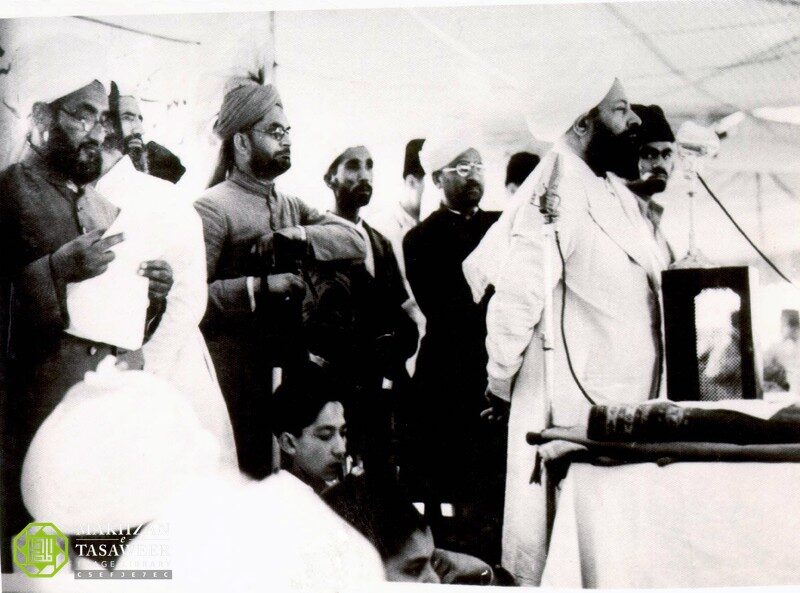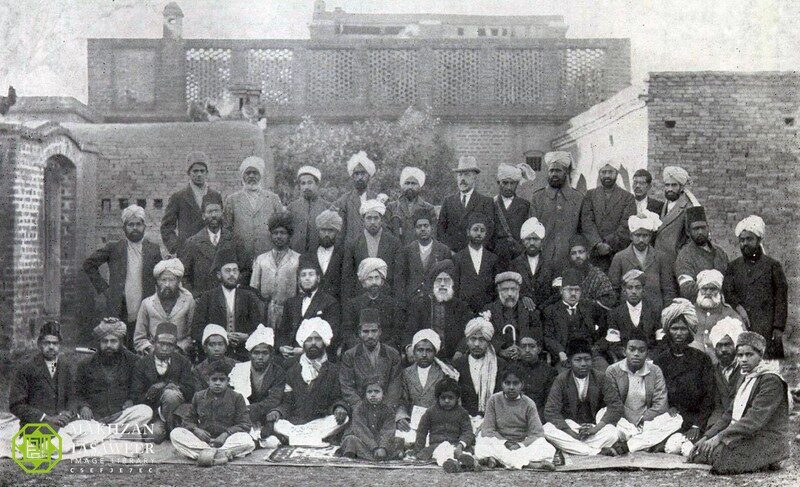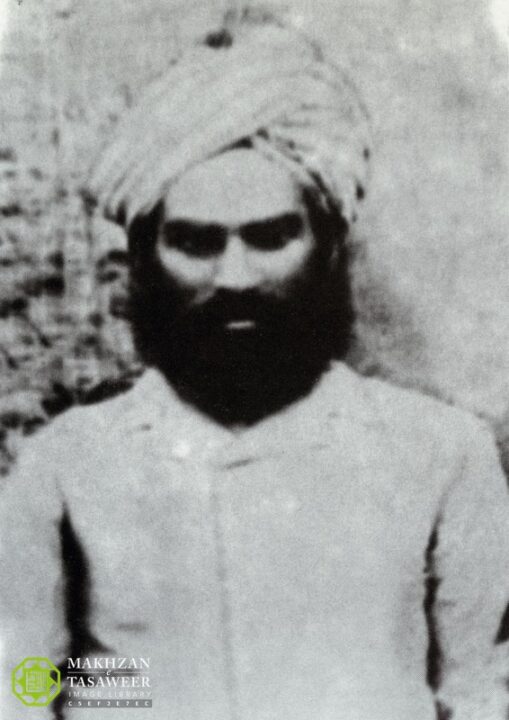
28 January 1944: Hazrat Mirza Bashiruddin Mahmud Ahmad, Khalifatul Masih IIra announced during his Friday Sermon that he was informed by God that he was the Musleh-e-Maud. Huzoorra shared details of his vision with Jamaat members in public. (Khutbat-e-Mahmud, Vol. 25, pp. 49-65)
28 January 1945: A group of Buddhists arranged a multi-faith event in Kanpur. An Ahmadi missionary also attended and shared the Jamaat’s views about other religions.
On behalf of Jamaat-e-Ahmadiyya, Maulvi Ghulam Ahmad Arshad Sahib delivered a speech on the topic of Islam being the universal religion. At the end, Hazrat Musleh-e-Maud’sra sermon, Paigham-e-Sulh (A Message of Peace) was also distributed among all the attendees. (Tarikh-e-Ahmadiyyat, Vol. 9, p. 559)
29 January 1926: A special jalsa was held in Qadian, which included 24 speeches in different languages. This jalsa was special as it was the first of its kind. Hazrat Mufti Muhammad Sadiqra supervised the project. The final speech of this unique jalsa was delivered by Hazrat Musleh-e-Maudra.
In his speech, Huzoorra alluded to the prophecy of the disciples of Jesusas that they would speak in different languages. He said that the meeting, and the speeches made in it, were clear proof of the truthfulness of the Promised Messiahas. (Tarikh-e-Ahmadiyyat, Vol. 4, p. 553)

29 January 1956: A delegation comprising of students from Government College Lyallpur (now Faisalabad) visited Rabwah and enjoyed the blessed audience of Hazrat Musleh-e-Maudra.
On this occasion, Huzoorra also gave some advice to these students at their request. These valuable guidelines serve as a beacon of guidance for youth and Muslim students, some of which can be read on pages 386 to 390 of Tarikh-e-Ahmadiyyat, volume 17.
30 January 1950: The first-ever Jamaat college outside of Pakistan was established and successfully run in Ghana. Dr Safiruddin Bashir of London was appointed as its pioneer principal.
The college was initially opened in a makeshift building in Kumasi. (Tarikh-e-Ahmadiyyat, Vol. 13, p. 284)
This college is still functioning today and is known as T. I. Ahmadiyya Senior High School – Kumasi.
30 January 1956: The Society of Servants of God, a group based in Mumbai, invited a missionary from the Jamaat to their annual convention.
This annual event of the Society of Servants of God was held in Pune until 2 February 1956. On behalf of the Jamaat, Maulvi Sharif Ahmad Amini Sahib gave a lecture on Islam and peace. (Tarikh-e-Ahmadiyyat, Vol. 18, p. 281)
31 January 1909: Among the most remarkable accomplishments of Hazrat Khalifatul Masih Ira was the establishment of the true status of Khilafat in the hearts and minds of Jamaat members and opponents alike. From the outset, certain individuals who were against the institution of Khilafat tried to stir unrest within the Jamaat. On this date, to firmly settle this debate, Hazrat Khalifatul Masih Ira called a special session of shura, which was attended by around 250 representatives. He delivered a powerful speech uprooting all doubts and misconceptions about the divine institution of Khilafat. He also invited certain members to reaffirm their bai‘at.
In Tarikh-e-Ahmadiyyat, volume 3, this incident has been described in detail and has been named “Yaum al-Furqan”. It can be read on page 258 of the said volume.

31 January 1977: On this date, the marriage of Hazrat Sahibzada Mirza Masroor Ahmadaa with Hazrat Syeda Amatus Sabuh Begum, daughter of Syed Daud Muzaffar Shah Sahib, took place. This blessed ceremony was graced with the attendance of Hazrat Khalifatul Masih IIIrh, who also delivered the nikah ceremony earlier on 21 January 1977. (Al Fazl, 4 February 1977, p. 1)
1 February 1943: Hazrat Maulvi Ghulam Hasan Peshawarira passed away. This companion of the Promised Messiahas did bai‘at in 1890. He was the father-in-law of Hazrat Mirza Bashir Ahmadra.
For more details, please see: www.ahmadipedia.org/content/personality/395

1 February 1949: Mian Ghulam Yasin Sahib was martyred in Kashmir.
Hazrat Khalifatul Masih IVrh, whilst mentioning this volunteer of the Furqan Battalion, said that Mian Ghulam Yasin Sahib, on 1 February, passed away from pneumonia during his service. Huzoorrh said that in the area where Mian Ghulam Yasin Sahib was situated, there were no special arrangements to stay heated and thus, many people who could not cover their bodies completely succumbed to the cold temperature. Mian Ghulam Yasin Sahib passed away while fulfilling this responsibility. (Friday Sermon, 21 May 1999, Germany)
2 February 1923: Hazrat Musleh-e-Maudra launched an appeal for a mosque to be built in Berlin with the donations of female members of the Jamaat. The ladies showed great zeal and enthusiasm towards this call and 100,000 rupees were collected.
On this occasion, Hazrat Amma Jan, Nusrat Jehan Begum Sahibara donated 500 rupees and Hazrat Nawab Mubaraka Begumra donated 1000 rupees, among many other noble sacrifices. (Tarikh-e-Ahmadiyyat, Vol. 3, p. 398)
This mosque, however, was not able to be constructed; and thus, the money raised was spent on the construction of the Fazl Mosque, London.
2 February 1949: Roshan Din Sahib reached Muscat to establish a Jamaat mission there. Only a few members were present in Muscat at the time.
Maulvi Sahib continued to perform his preaching duties in Muscat for a long time, and on 15 February 1961, he moved to Dubai. Eventually, he returned to Rabwah on 9 August 1961. (Tarikh-e-Ahmadiyyat, Vol. 12, p. 169)
3 February 1939: Hazrat Musleh-e-Maudra commenced a series of sermons detailing the modus operandi of Majlis Khuddam-ul-Ahmadiyya. This constitution was completed by 17 March.
Huzoorra said:
“I have repeatedly pointed out to the Jamaat that the reformation of one generation is not enough for the success of a people. Long-term schemes can only be successful if many successive generations continue to partake in them.” (Khutbat-e-Mahmud, Vol. 20, p. 30)

